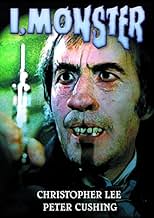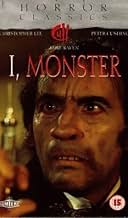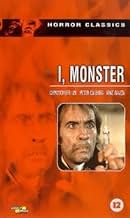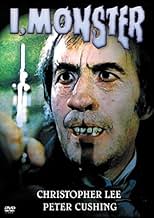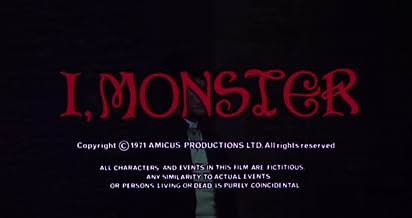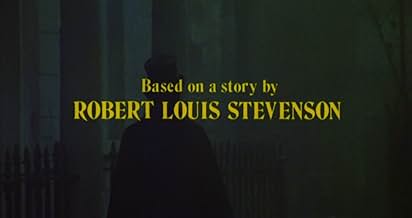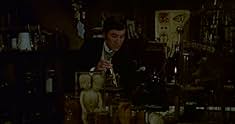CALIFICACIÓN DE IMDb
5.7/10
2.2 k
TU CALIFICACIÓN
Agrega una trama en tu idioma19th-century London psychologist Charles Marlowe experiments with a mind-altering drug. He develops a malevolent alter ego, Edward Blake, who his friend Utterson suspects of blackmailing Mar... Leer todo19th-century London psychologist Charles Marlowe experiments with a mind-altering drug. He develops a malevolent alter ego, Edward Blake, who his friend Utterson suspects of blackmailing Marlowe.19th-century London psychologist Charles Marlowe experiments with a mind-altering drug. He develops a malevolent alter ego, Edward Blake, who his friend Utterson suspects of blackmailing Marlowe.
- Dirección
- Guionistas
- Elenco
Aimée Delamain
- Landlady
- (as Aimee Delamain)
Jim Brady
- Pub Patron
- (sin créditos)
Chloe Franks
- Girl in Alley
- (sin créditos)
Lesley Judd
- Woman in Alley
- (sin créditos)
Ian McCulloch
- Man At Bar
- (sin créditos)
Reg Thomason
- Man in Pub
- (sin créditos)
Fred Wood
- Pipe Smoker (with Cap) in Pub
- (sin créditos)
- Dirección
- Guionistas
- Todo el elenco y el equipo
- Producción, taquilla y más en IMDbPro
Opiniones destacadas
Brilliant, clever, well-acted adaptation of Robert Louis Stevenson's great The Strange Case of Dr. Jekyll and Mr. Hyde. Dramatized by Amicus producer Milton Subotsky, I, Monster follows the original tale about as closely as any other with some major deviations. The characters in this film are Dr. Marlowe and Mr. Blake(?). Maybe they wanted to separate themselves from the original source material as much as possible or perhaps had a Rights issue. At any rate, I, Monster is a movie that builds and builds as Dr. Marlowe(Christopher Lee) tinkers with this new serum he has created that eliminates one part of the three parts of the brain(according to Freud). The reaction for each individual is different. For Lee, it sheds his formal, authoritative persona of its superego which then allows him to act any way he wants without any moral, ethical, or logical constraints. Lee's transformation is simple, effective, and strong. He goes from the stiff upper lip to the wicked, lecherous, carefree smile of a man of no moral code whatsoever. His eyes dance from one thing to another as the strangely effective music of Carl Davis plays a tune of light madness. Lee gives a great performance in this one and makes the film work. Without his skills, I, Monster would have little else going for it. Yes, Peter Cushing is in it. He plays Marlowe's attorney and is as always very solid in his otherwise mundane role. The rest of the cast is really nothing to speak of either. I have always liked Amicus and most of their horror entries from the late 60's and the 70's. They have the Hammer look about them without Hammer production values: translated that means that they look like Hammer imitations. Nonetheless, they usually have good stories and frequently paired Cushing and Lee together or singly. Subotsky's screenplay is laced with several philosophical layers. Director Stephen Weeks does a solid job behind the camera. For my money, I, Monster is definitely one of the best screen adaptations of Stevenson's work.
"I, Monster" is a respectable adaptation of the classic Robert Louis Stevenson tale of Jekyll & Hyde, albeit with some unconventional touches by screenwriter Milton Subotsky. Sir Christopher Lee stars as Dr. Marlowe, a psychiatrist / researcher who experiments with drugs, trying to get his patients to release their inhibitions. But when he tests his serum on himself, the results are predictable enough. He becomes an unhinged alter ego named Edward Blake, who indulges in debauched and nasty acts for their own sake. Meanwhile, Marlowes' lawyer Utterson (Peter Cushing) believes Marlowe and Blake to be two different people and thinks that the Blake character is blackmailing Marlowe.
While this slight film doesn't have quite enough style or gravitas to rate as anything more than routine entertainment, it's still reasonably well done. Produced by horror greats Amicus, its period recreation is decent, and its atmosphere likewise effective. Subotsky's touches include having Marlowe be a follower of Freud, so there are Freudian overtones, and the topic of the role that drugs play - or shouldn't play - in the treatment of patients. It does have the time honored appeal of any story with a Frankenstein type mad doctor twist. The makeup by Harry and Peter Frampton is pretty good, but the amount used on Lee is increased bit by bit on screen rather than utilized all at once. The music by Carl Davis is good. As directed by Stephen Weeks, a 22 year old budding filmmaker hired by Amicus at Lees' suggestion, it's actually not terribly violent - or as sexy as the stuff churned out by Hammer during this period. Much of the budget went towards an unusual 3D process exploiting the Pulfrich effect (which explains the camera movement), one that wasn't exactly pleasant to film for Lee.
As can be expected, the consistent professionalism and commitment to character by the two stars makes it all worthwhile. They're ably supported by exemplary actors such as Mike Raven, Richard Hurndall, George Merritt, and Kenneth J. Warren. That's a young Michael Des Barres as the youth who accosts Blake in the alley.
Agreeable entertainment, overall, although the ending is rather abrupt.
Six out of 10.
While this slight film doesn't have quite enough style or gravitas to rate as anything more than routine entertainment, it's still reasonably well done. Produced by horror greats Amicus, its period recreation is decent, and its atmosphere likewise effective. Subotsky's touches include having Marlowe be a follower of Freud, so there are Freudian overtones, and the topic of the role that drugs play - or shouldn't play - in the treatment of patients. It does have the time honored appeal of any story with a Frankenstein type mad doctor twist. The makeup by Harry and Peter Frampton is pretty good, but the amount used on Lee is increased bit by bit on screen rather than utilized all at once. The music by Carl Davis is good. As directed by Stephen Weeks, a 22 year old budding filmmaker hired by Amicus at Lees' suggestion, it's actually not terribly violent - or as sexy as the stuff churned out by Hammer during this period. Much of the budget went towards an unusual 3D process exploiting the Pulfrich effect (which explains the camera movement), one that wasn't exactly pleasant to film for Lee.
As can be expected, the consistent professionalism and commitment to character by the two stars makes it all worthwhile. They're ably supported by exemplary actors such as Mike Raven, Richard Hurndall, George Merritt, and Kenneth J. Warren. That's a young Michael Des Barres as the youth who accosts Blake in the alley.
Agreeable entertainment, overall, although the ending is rather abrupt.
Six out of 10.
With this feature, Amicus Studios (a British production company founded merely to cash in on the huge success of contemporary competitor Hammer, though with lower budgets and mainly specializing in anthology films) attempted to present its very own adaptation of the legendary and numerously retold novel "Dr. Jekyll and Mr. Hyde", by Robert Louis Stevenson. However, "I, Monster" turned out to be a rather curious movie and I honestly can't say for sure what it was that Amicus wanted to achieve and whether or not they succeeded in their effort. At first I assumed "I, Monster" was going to be only loosely inspired by the classic story, since there already are so many reminiscent versions available on the market and even more so because the screenplay changes the names of the protagonist from Dr. Jekyll and Mr. Hyde into Dr. Marlowe and Mr. Blake. But then it rapidly becomes obvious that this is actually one of the faithful adaptations of Stevenson's story, so that can't be an option. On a slightly off-topic note, in case you are looking for an offbeat and extremely loose interpretation of the same story, you can turn to the aforementioned Hammer again and check out "Dr. Jekyll and Sister Hyde". Maybe the original mission was to make the very first 3-D version of "Jekyll and Hyde", but that idea got abandoned in a fairly early stage as well and it's only still noticeable in some minor visual and cinematographic details. So, basically, all that remains is another redundant but nevertheless worthwhile re-enactment of a fantastic tale, once more pairing two of the greatest horror actors ever (Peter Cushing and Christopher Lee) and competently directed by one of the youngest filmmakers of that time. Stephen Weeks was still in his early twenties in 1971. I bet it must be a truly unique experience to give Lee and Cushing instructions on a film set on that age...
Lee and Cushing don't deliver their greatest performances here (far from it actually), but even at their most mediocre they nonetheless remain a joy to behold. Lee stars as Dr. Marlowe, a successful psychiatrist and devoted disciple of Sigmund Freud's theories. He firmly believes that mental illnesses can be caused by the repression of the true human nature (which is vile, mean and aggressive) and that both sides of the personality can easily be separated. He develops a drug, experiments on himself and gradually turns into a more relentless and incurable monster after each injection. His friends, including Peter Cushing as his attorney, want to help Dr. Marlowe but they automatically assume this mysterious Mr. Blake is an entirely different persona. The overall story is commonly known and this version doesn't feature any noteworthy differences. The doctor's transformations - mentally as well as physically - grow more monstrous, but the remarkable thing is he is the scariest during the earliest phases! Near the film's climax, Christopher Lee looks unrecognizable and heavily deformed but after the first couple of drug dosages he simply puts on a menacing and genuinely unsettling Joker-type of smile. Can you imagine Christopher Lee with a big smile like that? Now, THAT is scary stuff!
Lee and Cushing don't deliver their greatest performances here (far from it actually), but even at their most mediocre they nonetheless remain a joy to behold. Lee stars as Dr. Marlowe, a successful psychiatrist and devoted disciple of Sigmund Freud's theories. He firmly believes that mental illnesses can be caused by the repression of the true human nature (which is vile, mean and aggressive) and that both sides of the personality can easily be separated. He develops a drug, experiments on himself and gradually turns into a more relentless and incurable monster after each injection. His friends, including Peter Cushing as his attorney, want to help Dr. Marlowe but they automatically assume this mysterious Mr. Blake is an entirely different persona. The overall story is commonly known and this version doesn't feature any noteworthy differences. The doctor's transformations - mentally as well as physically - grow more monstrous, but the remarkable thing is he is the scariest during the earliest phases! Near the film's climax, Christopher Lee looks unrecognizable and heavily deformed but after the first couple of drug dosages he simply puts on a menacing and genuinely unsettling Joker-type of smile. Can you imagine Christopher Lee with a big smile like that? Now, THAT is scary stuff!
This odd adaption of Dr Jekyll and Mr Hyde was originally shot in a rare form of 3-D which depends on a complicated camera move, much to the annoyance of star Christopher Lee. But it was all worth it, Mr. Lee, because it stands now as your only 3-D movie for us to enjoy today! The 3-D only works when the camera is moving left to right or right to left and you need special glasses (with the right lens slightly darkened) to enjoy it. But in 3-D, the creeping camera moves and slow editing all make sense because the scenes spring to life with deep focussed 3-dimensional action. Now you know why Christopher Lee is always walking up and down his laboratory behind all the chemical glassware!
In the Nineteenth Century, in London, the psychologist Charles Marlowe (Christopher Lee) researches a new drug capable to release inhibitions and uses his patients as guinea pigs. He discusses the principles of Freud with his friend Dr. Lanyon (Richard Hurndall) and decides to experiment his drug in himself. He becomes the ugly and evil Edward Blake and his friend and lawyer Frederik Utterson (Peter Cuhsing) believes Blake is another person that might be blackmailing Charles. Meanwhile Charles loses control of his transformation.
"I, Monster" is another version of the classic story of Dr. Jekyll & Mr. Hyde. The art direction is very beautiful and the great attractions are certainly Christopher Lee and Peter Cushing. My vote is six.
Title (Brazil): "O Soro Maldito" ("The Damned Serum")
"I, Monster" is another version of the classic story of Dr. Jekyll & Mr. Hyde. The art direction is very beautiful and the great attractions are certainly Christopher Lee and Peter Cushing. My vote is six.
Title (Brazil): "O Soro Maldito" ("The Damned Serum")
¿Sabías que…?
- TriviaChristopher Lee (Dr. Charles Marlowe / Mr. Edward Blake) previously played Paul Allen in Las dos caras del Dr. Jekyll (1960), another film adaptation of Robert Louis Stevenson's 1886 novella "Strange Case of Dr. Jekyll and Mr. Hyde."
- ErroresAt c. 53:00 into the film, Utterson says he would recognize the exact details of the ornate head of Blake's cane. However, he has only seen this cane for a fraction of a second at nighttime, when it was used to assault him earlier in the film.
- Citas
Dr. Charles Marlowe: The face of evil is ugly to look upon. And as the pleasures increase, the face becomes uglier.
- Versiones alternativasOn Blu-ray, the film was released for the first time by Powerhouse Films in the UK. In addition to the theatrical version, there is the option to watch the extended version, which features two additional scenes. You can see Marlowe working in the lab, more conversations in the club and a conversation of Marlowe with his patient Diane. The scenes mainly deepen the theme of human duality, but are not strictly necessary.
- ConexionesFeatured in The Many Faces of Christopher Lee (1996)
- Bandas sonorasEine Kleine Nachtsmusik
By Wolfgang Amadeus Mozart (uncredited)
Selecciones populares
Inicia sesión para calificar y agrega a la lista de videos para obtener recomendaciones personalizadas
- How long is I, Monster?Con tecnología de Alexa
Detalles
- Fecha de lanzamiento
- País de origen
- Idioma
- También se conoce como
- I, Monster
- Locaciones de filmación
- Productoras
- Ver más créditos de la compañía en IMDbPro
- Tiempo de ejecución
- 1h 15min(75 min)
- Relación de aspecto
- 1.85 : 1
Contribuir a esta página
Sugiere una edición o agrega el contenido que falta


